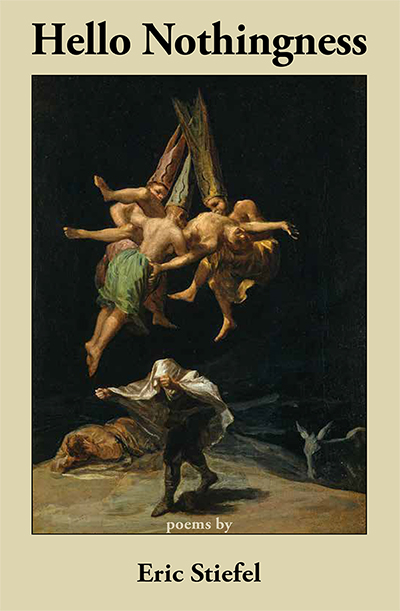by Nicole Yurcaba

With its montages of nature, former lovers, and decrepit gardens, Eric Stiefel’s Hello Nothingess might initially seem like a love letter to the deepest, most nihilistic pits of existence. However, despite the cynical, futile tone permeating many of the poems, Hello Nothingness provides a gentle reminder—beauty does not exist without a dash or two of strangeness and loss.
Many of the initial poems are existential snippets offered by a seemingly lost speaker. “I’d Gone Missing and Wondered What the Implications Were” pays homage to those times when one can’t quite figure out their place not only in the universe, but also in the present moment. The bucolic imagery of a solitary train driving by the cabin where the speaker stays reinforces the speaker’s sense of isolation. Lines such as “Voices carry from the distance of a different life” further establish the speaker’s seclusion. The poem concludes with the rhetorical questions “—is that what that was? is this all there is?” These rhetorical questions are one poetic brick in the collection’s foundation, and the posing of rhetorical questions is a technique the speaker frequently utilizes.
“Always a Game of You” is nostalgic, melancholic. It opens with the Eliot-esque line: “I spent the summer breeding lilacs out of a dead land—.” Phrases like “forgetful snow” and “ghost orchid” personify natural elements on which the poem relies. The poem harbors a few fairly unforgettable lines such as, “I grew into a moonflower” and “I clothed myself in August.” These lines show the speaker’s connection with nature and time. Nonetheless, the poem’s starkest, and perhaps darkest, moment occurs in its final line: “sometimes I’m afraid of myself. Didn’t you know?” It’s a quick, succinct, direct line—a statement followed by a question. A confessional cycle forms, one that’s carries into poems like “Phantasmagoric.”
“Phantasmagoric”—with its consistent use of italics and em dashes— is metaphorically violent and chaotic. This violence and chaos mirror the speaker’s self-deprecation. The poem opens dramatically: “Each time I kill one of my old selves—or more often let him loose / into the static—I stumble into his shade sometime later, often / when the seasons have changed and the lilacs have withered.” The personal balances with the natural, and though the em dashes are as much a tool for creating dissonance as they are for blurring the fine line separating the human world from the natural one. The italicization of the entire second stanza solidifies this dissonance and blur, and from this stanza forward, the poem’s reliance on em dashes wanes. Instead, the poem relies solely on commas to separate statements until the poem collides into a final rhetorical question.
“I Mean for a Thing to Be Other” is one of the collection’s hallmark poems. Consisting of two block-style stanzas, it is nostalgic, romantic, and confessional. Like other poems in the collection, it relies on natural imagery to communicate the most intimate moments in a relationship. The speaker focuses on the other person in the relationship, a person synonymous with nature and the act of gardening. The poem’s most poignant moment occurs in the line, “I’ve lost until loss became a kind of metaphor.” It’s a direct confession, a moment of unbroken and unhindered self-awareness.
Later in the collection, readers encounter “Two Rabbits in a Snowstorm.” The first stanza is objective, an observation, but the second stanza contracts inward to the self. Again, the speaker’s inner chaos displays itself: “I’m too busy / meandering on the edge of the present and trying to cast aside some / thimbleful of doubt. As if doubt could explain the pair of barn owls.” Thematically and tonally, it’s a cross between Robert Frost and Mary Oliver. Structurally, the poem is a clever yin-and-yang, delicately balancing the outward, observational experience with the conflicts of the self. This forms a human-versus-nature effect, albeit the speaker isn’t hellbent on conquering nature for their own benefit.
Hello Nothingness is vulnerable, portraying the inner life many are afraid to reveal. It’s a kaleidoscope of existence, of emotional peril, of self-doubt, and, ultimately, of self-acceptance. It is a collection in which the speaker is determined to shape an answer to the rhetorical question everyone may ask of themselves— “How do I begin to live with myself?”
Nicole Yurcaba (Ukrainian: Нікола Юрцаба–Nikola Yurtsaba) is a Ukrainian (Hutsul/Lemko) American poet and essayist. Her poems and essays have appeared in The Atlanta Review, The Lindenwood Review, Whiskey Island, Raven Chronicles, West Trade Review, Appalachian Heritage, North of Oxford, and many other online and print journals. Nicole teaches poetry workshops for Southern New Hampshire University and is a guest book reviewer for Sage Cigarettes, Tupelo Quarterly, Colorado Review, and The Southern Review of Books.



Add your first comment to this post